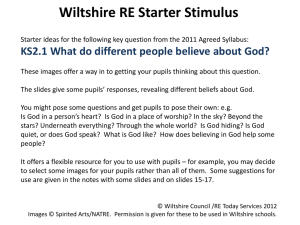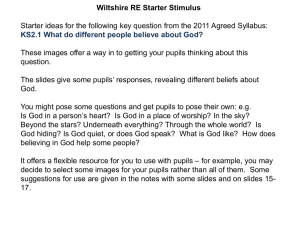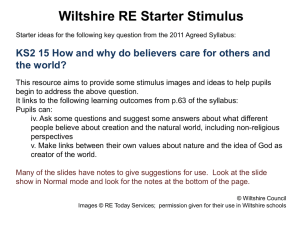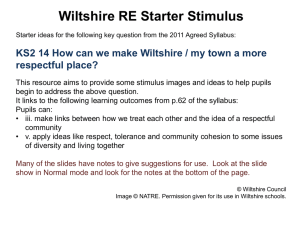Wiltshire RE starter resources
advertisement
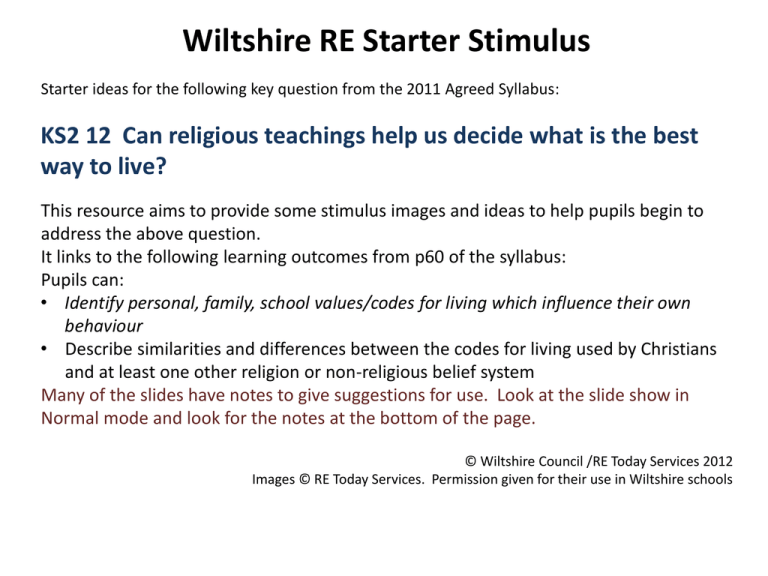
Wiltshire RE Starter Stimulus Starter ideas for the following key question from the 2011 Agreed Syllabus: KS2 12 Can religious teachings help us decide what is the best way to live? This resource aims to provide some stimulus images and ideas to help pupils begin to address the above question. It links to the following learning outcomes from p60 of the syllabus: Pupils can: • Identify personal, family, school values/codes for living which influence their own behaviour • Describe similarities and differences between the codes for living used by Christians and at least one other religion or non-religious belief system Many of the slides have notes to give suggestions for use. Look at the slide show in Normal mode and look for the notes at the bottom of the page. © Wiltshire Council /RE Today Services 2012 Images © RE Today Services. Permission given for their use in Wiltshire schools Do you know any rules people should obey? What kinds of rules are in… • The Firework Code? • The Highway Code? • Rules for Football or Netball or Hockey or Conkers? • Your School Code? Why do we have these rules? Why is it good that we have them? BIG Book Of RULES You are going to see four codes for living from different religions. Read them through carefully. 1. Try and work out what people must have been doing, if their God or religious leader gave them these rules. 2. Compare two different codes for living. Identify at least three similarities and two differences. Judaism: The Ten Commandments 1. Put God first in your life. 2. Don’t love anything else more than you love God. 3. Respect God’s name. 4. Keep one day a week for rest and worship. 5. Have respect for your parents. 6. Don’t kill anyone. 7. When you’re married, don’t cheat on your partner. 8. Don’t steal. 9. Don’t tell lies. 10.Don’t be jealous of what other people have got. Exodus Chapter 20 Christianity Jesus taught that the two greatest commandments are: Love God with all your heart, mind and strength. Love your neighbour. In the Sermon on the Mount (Matthew Chapters 5-7) he also said that his followers should: • Forgive others • Treat people fairly • Not judge others • Be generous • Love their enemies • Speak honestly • Not worry Islam The Holy Qur’an teaches Muslims to… • Always love Allah first. • Think about what Allah expects when making decisions about what to do and what not to do. • Believe in God • Keep on praying • Give regularly to charity • Keep your promises • Be patient in times of suffering and difficulty. Chapter 2 v177 Sikhism The teachings of Guru Nanak say: • • • • • • • • • • • There is only one God Worship and pray to the one God and to no one else Remember God, work hard and help others. God is pleased with honest work and true living. Before God, there is not rich, no poor, no black or white. Men and women are all equal before God. Be kind to people, animals and birds. Do not fear. Do not frighten. Always speak the truth. Be simple in your food, dress and habits. Suggestions for further activities: 1. Put all the rules onto separate cards and see if pupils can sort them to the correct religion. This will help to show some of the similarities and differences. 2. Ask pupils to consider the place of God in these rules. Why is respect for God and worship of God so important in these codes? What does it show about what matters to believers? 3. Many people think that rules for living are negative and restrictive – “Don’t do this… Don’t do that”, as if God is some kind of kill-joy. Most religious believers do not see it like this. Can pupils think of any reasons why believers find the rules helpful, even liberating, in their everyday lives? [Think about how the rules of the road are not restrictive but helpful; think about what it means if there is a creator God who loves people, and who gives some guidelines for life.] 4. Imagine a world where everyone lies. Ask pupils to write a diary entry for The Day Everybody Lied, starting from the moment their alarm clock woke them up – with the wrong time…. What would it be like? 5. Give out a selection of rules (from one religion or several). Ask pairs of pupils to consider what would happen if a) everybody kept that rule and b) everybody broke the rule. Ask pupils to give concrete examples of what might happen. 6. Ask pupils to put together and perform a Good News report where people obey the kinds of rules reflected in the religious codes for living. How would it affect people? 7. Give groups of pupils nine rules on card; ask them to sort them into a “Diamond 9”, with the most important at the top and the least important at the bottom. They need to take turns in placing the rules, asking the person next to them where they think it should go, explaining why they think it is important or not. They can move someone else’s card as long as they say why. 8. Ask pupils to agree the top 4 rules for society. Why are these important? What would you do with people who do not obey the rules? Does your idea for punishment fit in with your rules? (i.e. if you talk about loving others or being fair, is your punishment loving or fair?)





